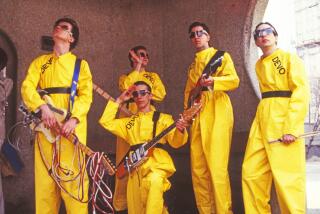‘Death’ shows there’s life yet in Metallica
- Share via
Metallica
Death Magnetic
(Warner Bros. Records)
***
Pop music might be the only business whose leaders are regularly criticized for trying to stay relevant. Do iPod users slag off Steve Jobs for updating the device? In the other arts, change is also welcome. Painters go from period to period; playwrights and novelists tackle topical subjects and mess around with literary form. But if pop artists -- and especially rockers -- explore new technologies or dip into trends, critics accuse them of being untrue to themselves, growing weak and selling out.
No one knows this better than Metallica. The band, which first triumphed reforming a bloated heavy-metal scene in the early 1980s, has encountered public resistance every time it has tried to adapt or augment its sound. That’s made for a tough quarter-century. The band kept taking risks but eventually lost confidence and wound up in a depression culminating in 2003’s miserable “St. Anger.”
“Death Magnetic” enacts the band’s process of recovery, using a tried-and-true method: game therapy. Throughout “Death Magnetic,” the band presents its music as existing in its own space, uninfluenced by fashion or the news, true only to its own rules and pleasures -- like a game.
Rock has become a game for many people lately, and that’s what Metallica is counting on. Many factors contribute to this album’s power. Guitarist Kirk Hammett solos with gusto after being reined in on the last release; the purist Rick Rubin replaced the interventionist Bob Rock as producer, and a finger-picking new bassist, Robert Trujillo, has put some new spring in their sound. But maybe most important for Metallica as a band and a business is the chance to release “Death Magnetic” simultaneously as a download for Guitar Hero III: Legends of Rock.
The long, intricate, powerful songs Metallica offers here are ideal challenges for the hand-eye coordination addicts who’ve made music-oriented video games big business. With the shortest track still more than six minutes and the longest, “Suicide & Redemption,” a nearly 10-minute instrumental, “Death Magnetic” demands that listeners put aside other distractions and immerse.
Although there are a couple of prettily brooding ballads with orgasmic climaxes, including the first single, “The Day That Never Comes,” most songs here rely on a different kind of hook: the interest that comes from trying to follow rapid-fire guitar riffs and drum patterns, sudden tempo changes and dynamic shifts that alter the effect of repeated phrases. This kind of attention is best experienced in the fingers as well as the ears.
Fans who don’t join Metallica’s team via Guitar Hero can still be armchair quarterbacks, reveling in the band’s interactions on songs that, to the casual listener, might be indistinguishable from one another. “Death Magnetic” is being hailed as a return to the powerhouse 1980s Metallica sound, but it’s not simply that: It’s an obsessive examination of that sound, a truly physical exercise in remembering. Aficionados already are tracing the links between particular riffs and solos and ones from years past; the revisiting feels deliberate, a rerun of championship plays.
Elevating the game above all else, Metallica doesn’t bother with relevance. James Hetfield’s death-oriented lyrics operate more like musical cues than story lines; maybe the ones related to physical harm (blood, crush) signaled Lars Ulrich to hit his snare, while biblical references (Judas, towers, apocalypse) prompted Hammett to stomp on his pedals. Read as signals -- or as color, like the boom of a timpani -- Hetfield’s words are less hackneyed. And he clearly relishes uttering them, snarling and salivating like the big bad wolf.
Serious games refresh the spirit of participants and observers alike by clearing a space away from the daily grind and enacting a beloved ritual. That’s what “Death Magnetic” does. It’s not innovative; it doesn’t speak powerfully to this moment. It’s a conservative, preservative move by men who needed to reclaim their ground. But playing by those rules, Metallica wins.
--
More to Read
The biggest entertainment stories
Get our big stories about Hollywood, film, television, music, arts, culture and more right in your inbox as soon as they publish.
You may occasionally receive promotional content from the Los Angeles Times.










